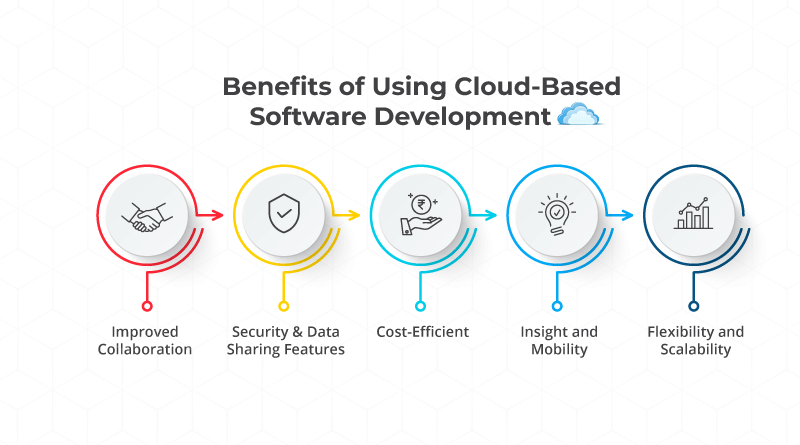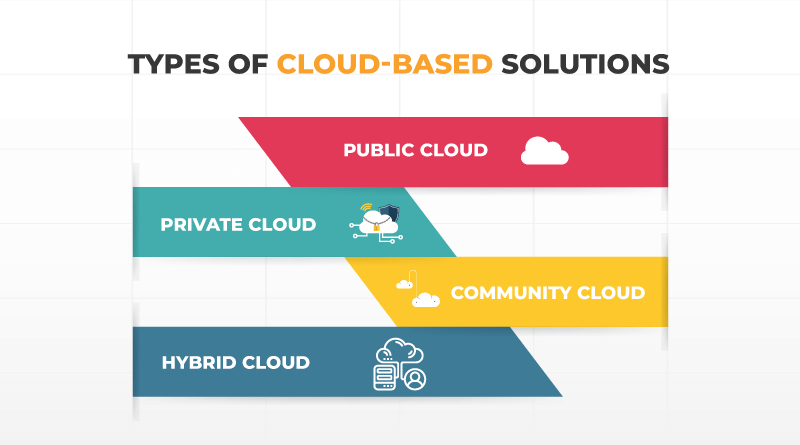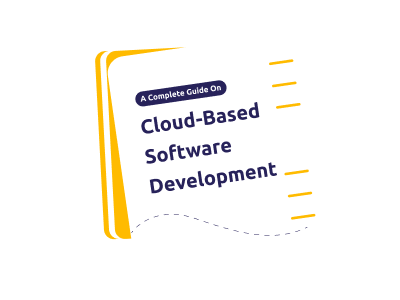Cloud-based software development is on the rise in the modern era.
Various industrial reports are showing that as the mobile apps business has increased, the issue of storage capacity, performance, and other things have increased. The best way to deal with such issues is by using Cloud computing.
Cloud-based app development makes data collection easy for organizations. On top of that, management and security factors are simplified. Cloud apps help modern enterprises to develop productive apps to improve the customer experience (CX) and revenue.
Cloud software solutions also assist organizations to invest in different low-code application development, and helps in saving time and cost. In this article, we will discuss everything that one should know about the cloud-based app/software development. Let’s start with the same.
What is Cloud Technology?
Cloud technology simply refers to the technique, service, or software that is retrieved over the internet. This technology stores data in the data centers and ensures access to the app and files is available from anywhere.
As the app or services are made accessible from anywhere using cloud services, a business that deploys this technology saves a lot of resources. This technology is cost-effective, one can skip frequent updates while using cheap cloud hosting technology and business can also save the maintenance cost of servers.
Another important fact is that one can operate business processes from any remote location. For instance, Dropbox, Google Drive, Apple iCloud, Microsoft OneDrive, etc., are popular and commonly used cloud services.
What is a Cloud-based App or Software?
A custom software or a cloud-based app is a program that runs over the internet. To understand differently, cloud-based software of apps lets the user interact with the app or services through a mobile browser or web browser. The ultimate data processing takes place on a remote server and is then managed by using specific APIs. The customer’s device acts as an input device while using the cloud app, and it doesn’t interfere with other major processes of the app.
Any cloud-based app is always different from web apps. To understand the cloud apps in detail, we will see various characteristics and other details about them in the further article.
Cloud-Based Application: Characteristics
- In cloud app development, the data of the app is stored in a cloud architecture and could be cached on the user’s device. This also means that there are smaller requirements for different devices for running the cloud app.
- This infrastructure can store information temporarily on the user’s device which allows users to access the services offline. Once they come online again, the cloud app updates and uploads data from the offline data storage to a cloud storage location.
- You can easily set the backup schedules, data optimization, encryption, and compression depending on your choice.
- Cloud apps can be accessed using devices to which the internet is connected like tablets, desktops, mobile, etc. This helps you to get browser independent.
- Cloud apps offer access to third-party cloud computing solutions using API integration and it is more customized than any web app.
These are the basic properties of a cloud app or software. Now, we will see what types of cloud solutions one can adopt to digitalize their enterprises and businesses.
Related: What Makes Cloud Technology Ideal For Web App Development
Domains Where Cloud-Based Apps Are Used
Here are the most common cloud-based apps that are used popularly in the market:
- Cloud-based apps for email
- File storing and sharing
- Order entry services
- Apps for inventory management
- Word processing
- CRM (Customer Relationship Management) software
- Financial accounting services
- Data collection
Cloud-Based Applications: Benefits
The quick reliance of organizations on cloud-based technology is evident using the Gartner survey. This survey predicts that there are more than 60% of companies that rely on cloud computing technology to perform their functions. This also depicts that projects that use cloud-based technology, offer greater advantages to the business.
Now, we will discuss some benefits of the cloud-based app that are used by modern organizations.
Benefits of Using Cloud-Based Software Development

Improved Collaboration
As the cloud-based solution allows sharing of data across locations and platforms, these apps are effective and efficient for enhanced collaboration. These cloud-based products help employees to create projects in groups and with a team even when everyone is working remotely and in real-time.
Ultimately, collaborations reduce the time to market the product and enterprises can save time, and improve their customer services.
Security and Data Sharing Features
Information and data stored in the cloud architecture are instantly available to the users. The easy accessibility of the data often raises security and privacy questions. However, amplifications in the cloud structure are deeply focused on data privacy and security.
Cloud technology guarantees the security of user information, and this feature makes it a viable alternative for storing data. While building cloud apps, the developers provide a structured solution to back up and restore the data in case the data is lost.
Cost-Efficient
The cost-efficient property of cloud-based apps makes them a good alternative for businesses as they can scale up or down the expense as per the company’s requirements and budget. Cloud service providers can ensure that the user is paying only for the services they are using. This specialty makes it the most used alternative.
Additionally, most cloud providers offer exquisite maintenance and support and ultimately decrease the excessive cost of support and maintenance services. This platform can store data safely and share it without buying different storage devices. Because of these reasons, cloud software or apps are the cost-effective solutions.
Insight and Mobility
Through cloud app platforms, you access information across devices, teams, gadgets, companies, and much more. It isn’t that surprising to watch organizations that invest in managed cloud hosting services and have good employee engagement and satisfaction as compared to local hosting organizations.
Cloud-native apps help businesses with customized customer data records to increase the speed of accessing data.
Flexibility and Scalability
With cloud-based software solutions, you receive flexibility while using the cloud as compared to local server hosting. Additionally, cloud architecture can meet your requirements easily with extra bandwidth instead of updating the complete infrastructure.
Moreover, the scalability of cloud-based apps will give you the required performative app per your company’s requirements. You can easily expand or cut down your cloud-app features depending on the future requirements of your firm. Hence, even if the number of users increases in bulk, you can manage your cloud-based app easily.
Types of Cloud-based Solutions

Cloud computing includes different resources and services like data servers, databases, storage, and much more. These services are executed by third parties. These parties authorize the computer infrastructure and reserves on paid or free basis. In a nutshell, you can get the resources, services, and storage without having to worry about maintenance and infrastructure.
There are mainly 4 types of cloud deployment for organizations:
Public cloud
Information stored in the public cloud is only accessible from an authorized device. These clouds offer optimal cost and data processing flexibility.
Private cloud
Private cloud functions as a single private web system with a safe space for apps, data, and the web. This cloud service is used by a company that has no public access.
Community cloud
This cloud service deployment is quite similar to the private cloud. The primary difference is data sharing between different organizations. For example, every government has different departments internally, and that need the same resources and infrastructure, and here the role of the community cloud enters.
Hybrid cloud
This structure is used for cloud-based app development for both private and public types. You can spread the information amongst third-party apps and on-device services along with different variants for optimization and deployment.
You can use these cloud deployment solutions for different app services. Like deployment services, there are different cloud app development solutions that enterprises can use. Three big cloud-based app development alternatives are SaaS, PaaS, and IaaS. Let’s understand each alternative in detail.
Related: Common Challenges in Cloud Security and Their Solutions
SaaS (Software as a Service)
SaaS solution develops cloud apps that are used from mobile apps and browsers. SaaS services help customers to access the app online using the internet and without configuring and installing from different devices.
SaaS is used for building different apps/tools like:
- Giving email tools, updating and auditing features, etc
- Service sign-ups and automating products
- Maintaining documents, file sharing, and collaboration
- Dividing the whole calendar among the entire company that is used to plan certain common events for employees
- Using CRM systems like databases of prospect data and clients
Here are the well-known companies that are interested in using SaaS solutions for cloud-based development- Zendesk, Google Apps, AWS, Salesforce, and many more.
IaaS (Infrastructure as a Service)
IaaS solutions include services like your cloud service provider managing your whole business infrastructure such as server, network, visualization, and storage. This infrastructure is managed by a public or private cloud. In addition to controlling the resources, the IaaS cloud offers tons of additional services such as:
- Tracking
- Detailed invoice
- Log Access
- Resiliency tools (replication, recovery, and backup)
- Load balancing
- Security instruments like PCI-DSS compliance, data encryption protocols, etc.
- Clustering, and much more
To use IaaS cloud services like you can utilize the admin panel and API for good directions. Furthermore, you can manage your operating systems and programs while the cloud service provider maintains resources for cloud app development.
Here are some popular cloud app instances that use IaaS services, they are- PayPal, Zoom, Slack, and many more.
PaaS (Platform as a Service)
PaaS cloud-based service provider is a solution where a third-party provider delivers software and hardware tools that can be used with the internet. PaaS solutions allow users to use the hardware along with primary development software.
Developers can use the latest software version while using PaaS, as it keeps on getting updated regularly. It also offers scalability as per the customer’s requirements. PaaS is flexible and cost-effective. Here are some PaaS solutions:
- Developing Middleware
- Building tools
- Operating systems
- DB running infrastructure
Some popular PaaS cloud platforms are Heroku, Windows Azure, OpenShift, etc.
Technical Challenges of Cloud-based Apps
Developing a cloud-based app is a challenging thing technically. This is the reason why you should understand the hidden pitfalls of cloud-based solutions before adopting this solution. Here’s the list of some challenges that one may have to face while working with Cloud-based apps:
Reliability
You have to pick a reliable cloud framework for running your cloud-based app to perform functions smoothly and without any mistakes. Analyze your cloud provider’s degree of security and make sure that it matched your organization’s needs. AWS solutions are used frequently for cloud app development as one of the most trustable cloud frameworks.
AWS helps build up all the data security and has developers a huge pool of different tech features to work with. You can easily monitor the cloud service usage, robustness, and productivity, and also learn SLAs, which ensures that your cloud apps are accessible at any given time.
Security
A large amount of data that is private, is stored and managed by different cloud-based services. This results in potential security risks in every organization that used cloud-based services. Hence, businesses must detangle the security processes of their cloud software and use SSL protocols along with different encryption standards like DES (Data Encryption Standard), 3DES (Triple DES), & AES (Advanced Encryption Standard) to secure the information that is stored or used. One can also use a cryptography approach when the encrypted data is divided into different parts and stored in different clouds.
In such cases, your cloud software will provide card payments, you must be PCI compliant. Such standard helps with card holder’s data security and the use of necessary cloud service vendor.
Scalability
If one wants to enjoy the cloud app scalability feature, you have to take care of this beforehand regarding its tech realization. While different cloud vendors promise to give scalability without any issues created, only a few of them can achieve scalability. In case of the popularity rise of the app, you can be sure that your app’s backend will handle extra data flow easily.
To get scalability, one needs to go with the hybrid cloud architecture. A hybrid cloud model can be scaled up or scaled down as per the requirements. Do not use a predefined software that gives scalability services for 2 or more bucks, first, discuss it with your custom software development service provider.
There’s still an ocean of information available on cloud-based software development. We will try to share more information about the same in our next piece of information. However, the majority of organizations are using cloud services for storing their data and providing services. So, you can give it a shot if you feel that your business needs are being fulfilled. For more information, stay in touch! Happy reading!








